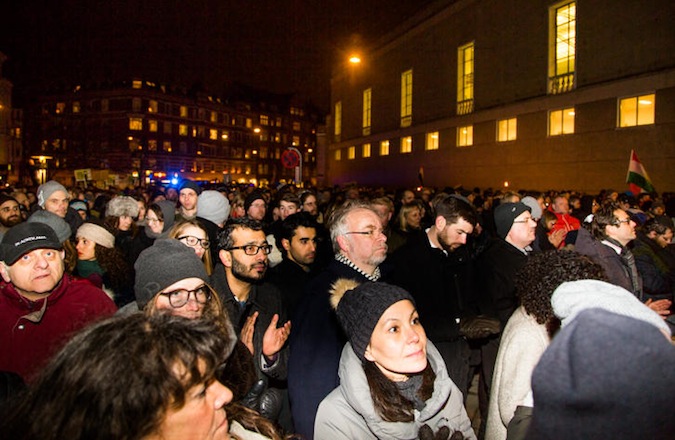(JTA) — As a longtime promoter of Jewish-Muslim dialogue in Denmark, Naveed Baig is no stranger to Copenhagen’s Great Synagogue.
The imam at the capital’s Danish Islamic Center, Baig, 39, has on numerous occasions sat under the structure’s gold-and-white ceiling meeting with people he calls his “Jewish brethren” to discuss issues of common concern.
On Monday, Baig was back at the synagogue to express solidarity with the Jewish community following the slaying of a Jewish volunteer guard by a Muslim extremist outside the building early Sunday morning.
But this time, Baig was not alone. He was part of a march by tens of thousands of Danes, including countless Muslims, who were shocked by an attack seen as underscoring the growing threat of anti-Semitic violence in the region.
“The attacks were on every Jew, every Muslim, every Christian and every person,” Baig said. “That is what we from the Muslim community came to say.”
The vigorous response to this latest attack on Jews in Europe has inspired hope among both Jewish and Muslim leaders that a renewed determination is emerging to confront the proliferation of religious hatred.
In Norway and Sweden, Muslim religious leaders have spoken out in defense of Jews more loudly than they have after previous attacks. In Oslo, Muslim activists are planning to create a human chain of peace and solidarity around the city’s main synagogue.
In Copenhagen, dozens of imams representing nearly all the local Islamic communities visited the synagogue on Monday as part of a coordinated show of unity between the Jewish community and Copenhagen’s largest mosque. On Wednesday, thousands attended the funeral of the Jewish guard, Dan Uzan, who was watching over a bat mitzvah celebration along with two Danish policemen, both of whom sustained serious injuries in the shooting.
Among the funeral attendees was the Prime Minister, Helle Thorning-Schmidt, whose government this week pledged approximately $153 million toward a new counter-terrorism plan, a move which Jewish community officials expect will end years of haggling over reimbursement for the community’s considerable security costs.
“The response of Danish society has been fantastic,” said Bent Lexner, the country’s former chief rabbi.
“Unfortunately, much of the anti-Semitism in Denmark comes from some of our Muslim brothers, so moderate Danish Muslims’ vocal rejection of such hate is especially important,” he added.
Uzan’s funeral was one of hundreds of vigils and commemorations held across Denmark after the violence on Sunday, which also claimed the life of Finn Nørgaard, 55, a Danish film director attending a talk by a cartoonist who had been under police protection for having lampooned Islam.
The perpetrator of both attacks, Omar Abdel Hamid El-Hussein, 22, was born in Denmark to Palestinian parents and was reportedly radicalized while serving a prison sentence for a previous act of violence. El-Hussein was killed in a shootout with police hours after the attacks, when he opened fire as they approached him for questioning.
In the days that followed, Muslim leaders across Scandinavia expressed solidarity with the Jewish community in a series of moves that Jewish leaders in the region say are unprecedented and well beyond anything that followed the slaying last month of four Jews in Paris.
In Norway, more than 1,000 Facebook users said they would participate in the Muslim-led initiative to form a protective human chain on Saturday night.
“This is definitely among the most impressive responses to the attack,” Ervin Kohn, president of the Jewish Community in Oslo, said of the initiative. “I think it can change the dynamics of interfaith dialogue in Norway and maybe beyond.”
“The threat is dawning on people from the Muslim community here,” said Lena Posner-Korosi, the president of the Council of Swedish Jewish Communities. “The attack hit closer to home than ever before and it’s a wake-up.”
For Elvir Gigovic, the chairman of the Swedish Muslim Council, expressing support for Jews is partly about returning a favor. His community remembers how Swedish Jews spoke out vocally in condemnation of a string of arson attacks on Swedish mosques late last year, which were attributed by Muslim activists and anti-racism watchdogs to far-right radicals.
“So when the Jews are attacked in the name of Islam and Muslims, it is important that we Muslims show solidarity with the Jews,” Gigovic added. “There are many Muslims who see their vulnerability and will do our utmost to safeguard their freedom.”
Gigovic, a refugee from the Balkan wars who says he “can directly relate” to the trauma of Jewish Holocaust survivors, said Scandinavian societies must reject hate to avoid becoming secondary victims of the Copenhagen attacks.
But suspicion runs deep on a continent where, according to several sources, hundreds of young Muslims have received combat training in Syria or Iraq and where attacks on Jewish communities seem to follow every new round of Arab-Israeli violence.
Baig, the Danish imam, said he is sometimes criticized for his interfaith initiatives by colleagues. In a sermon delivered just two days before the Copenhagen shootings, Hajj Saeed of the city’s Al Faruq Mosqe called interfaith encounters with Jews a “malignant idea” and praised the Prophet Mohammed’s “waging war against the Jews.”
Kenneth Sikorski, a non-Jewish pro-Israel activist from Finland, called the condolences offered to Jews by at least one prominent Danish imam, Jehad al-Farra, “crocodile tears” because that imam has endorsed the Muslim Brotherhood and Yusuf al-Qaradawi, a controversial Egyptian cleric barred from England and France on account of his views.
But Gigovic, the Swedish Muslim leader, remains hopeful that Scandinavian societies “can emerge stronger from this, continue the started dialogue, strengthen and support each other.”
JTA has documented Jewish history in real-time for over a century. Keep our journalism strong by joining us in supporting independent, award-winning reporting.






